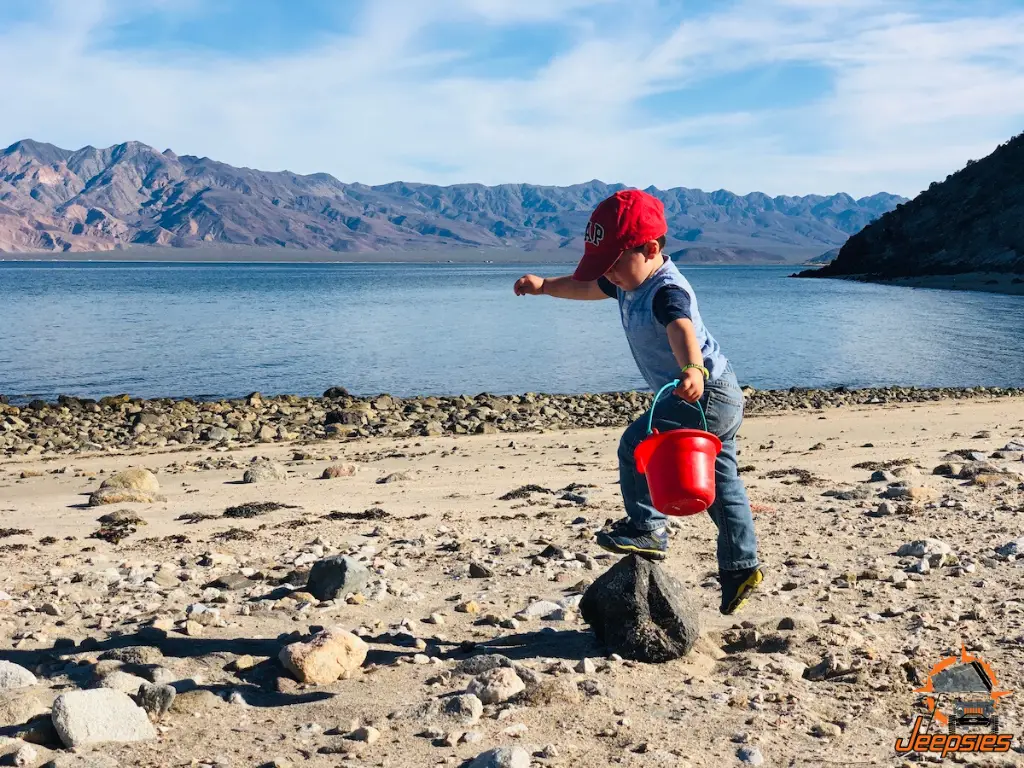
Forget the bag packing, sleeping arrangements, and meal plan. Do you know why you’re getting ready to go overlanding with a toddler? If you don’t know why you’re about to confront the extra stress of driving days, long nights, and temperamental weather, then the experiment has practically failed before you even leave the driveway.
I’m here to cast an empowering light on the ways overlanding can impact your youngster and entire family for good. The principles you learn here will motivate you to keep going when you meet the inevitable hurdles. You’ll already understand why the trouble is worth it.
The experience I’m leaning on
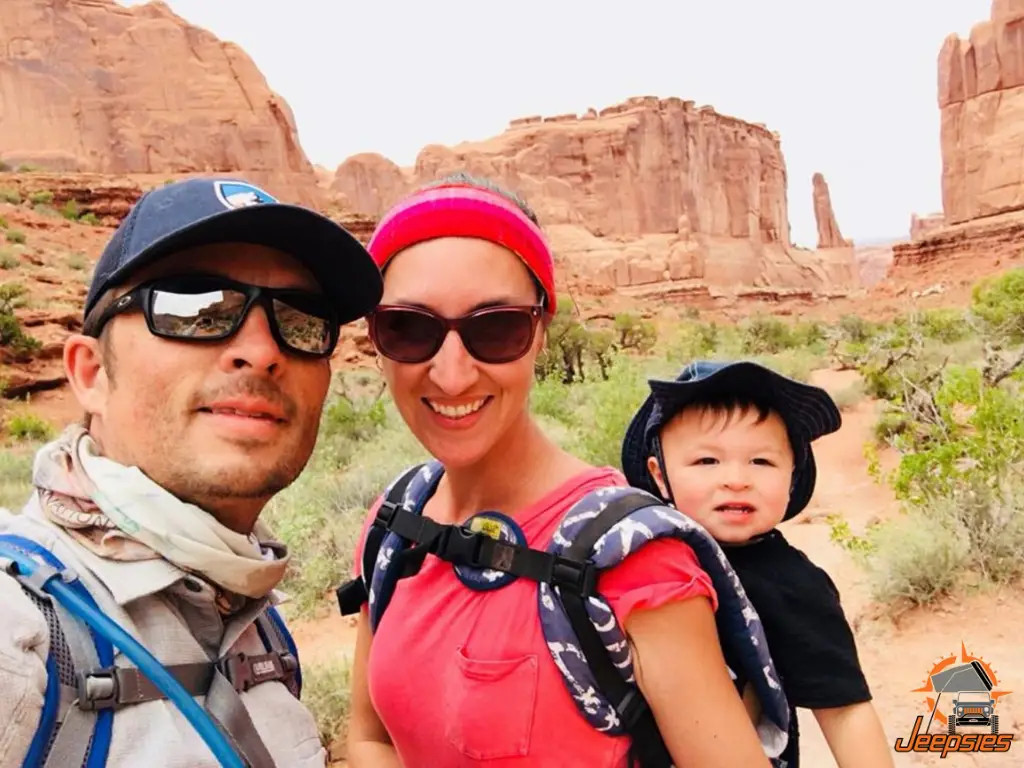
Before I launch into my principles of overlanding with a toddler, a little background. My husband Eric and I sold everything and started traveling full-time in February 2014. Our first home on wheels was 40 feet long. We weren’t overlanders; we were RVers.
In December 2016, our son Caspian was born into this full-time travel lifestyle. It’s all he’s ever known. And when he turned one and we became obsessed with overlanding, Caspian went along for the ride.
Since then, we’ve explored 4,000 miles through interior Mexico and the entire length of the Baja Peninsula in our Jeep Wrangler, presented at several events including Overland Expo, and made plans to overland the world.
So while we’re relatively new to overlanding, we aren’t new to traveling full-time with a toddler. Not surprisingly, the principles are similar across the board because Travel is the teacher, irrespective of the mode of travel.
Do you want to do this? Get out on the track with your entire family? Then here are 10 principles to enrich your experience of overlanding with a toddler.
1/ Have confidence you’re doing a valuable thing
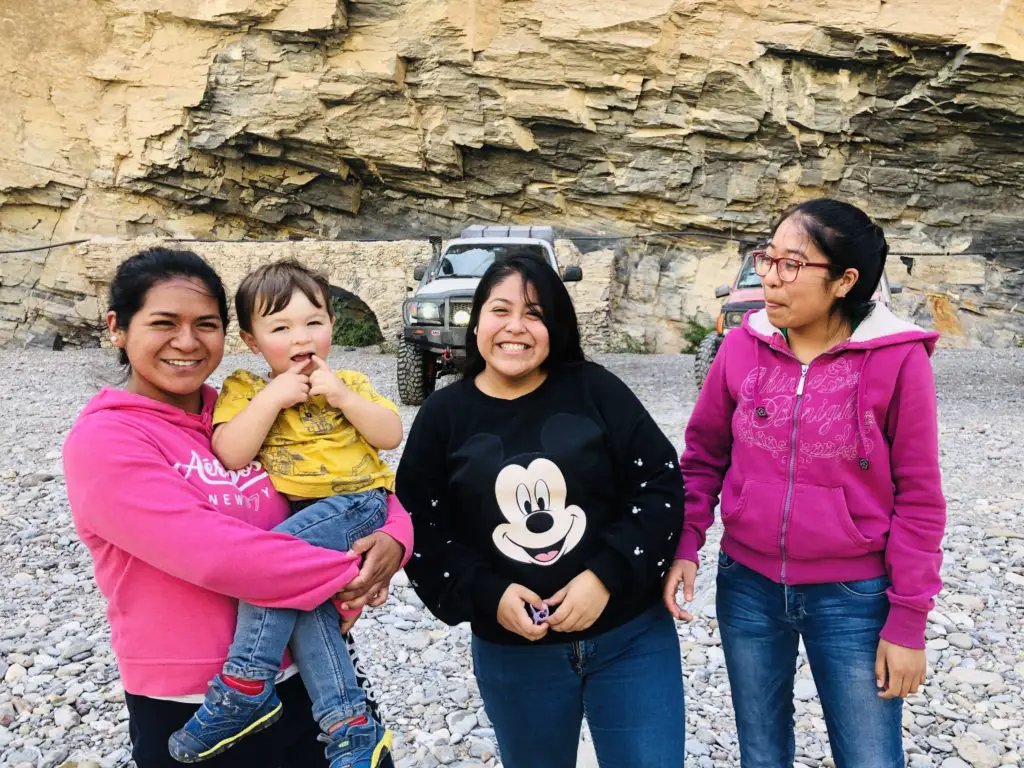
As you prepare for your first overlanding trip with a toddler, you may experience self-doubt. “Will I be able to keep him safe?” “Will she be miserable?” “Will he miss out by not being around other children at daycare?”
It’s only normal you confront these questions and many others. But ultimately, you need to be constructive by looking for answers that put your fears to rest. Or, if you’ve come to the end of the answers, you may have arrived at the juncture where you just have to leap.
You will find a safe landing. There will be challenges, and you’ll get through them one at a time. On the other side, you’ll find you were responsible for developing resilience and flexibility in your toddler. And wouldn’t all of us adults love an extra dose of those qualities?
2/ Be realistic about travel days
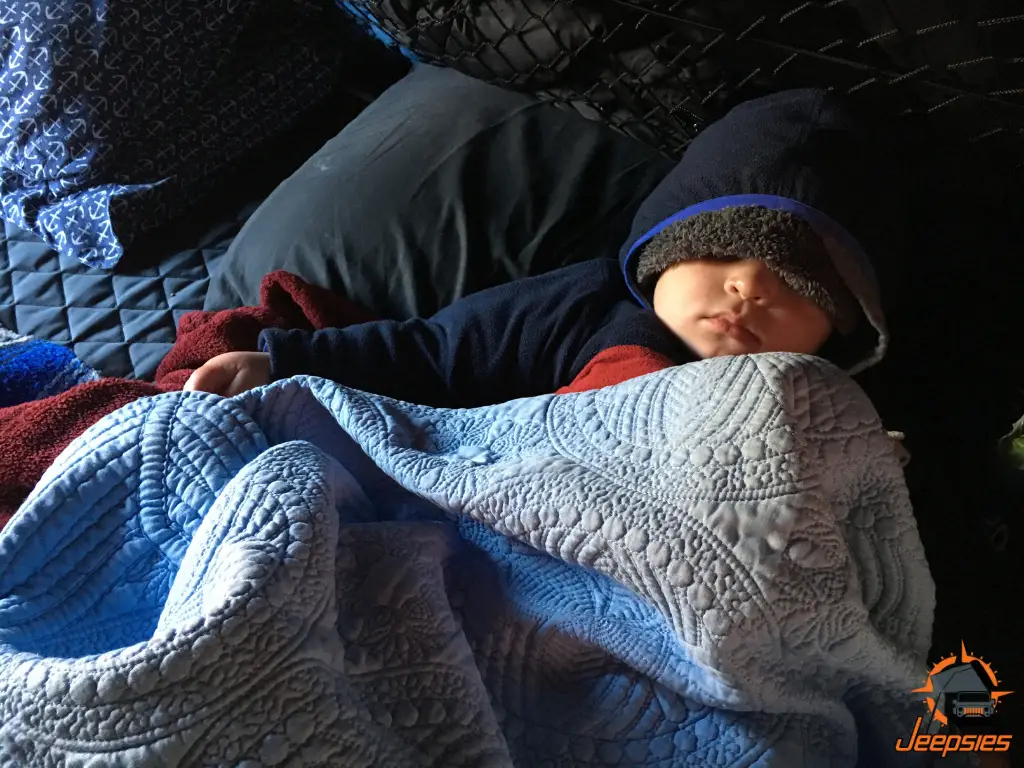
When your schedule demands you overland on weekends or during those two weeks of vacation time, it’s always tempting to be overambitious. I’m telling you right now: the fastest way to misery is trying to do too much.
On the other hand, if you keep travel days shorter and leave time in between driving for relaxation and fun, the whole family will enjoy the experience much more.
This applies especially to your toddler, who may not be used to spending long stretches in the car seat. Help him adjust to the idea of overlanding by keeping his needs in mind as you plan your next overlanding trip.
Even before Caspian was born, our upper travel limit was 250 miles a day. Once he started traveling with us, even 200 miles felt long. He’s now three and his endurance is much higher. But keep in mind, he has more than three years of practice under his (seat)belt.
3/ Be smart about choosing your drive time
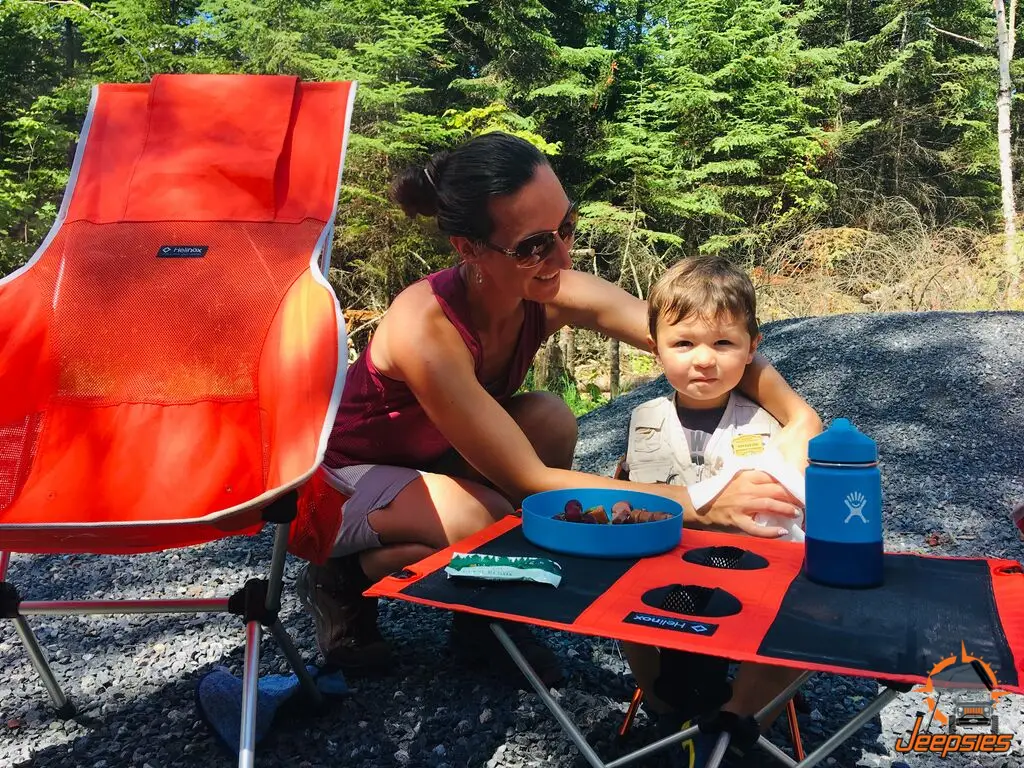
This principle also has to do with time. Now that you’ve shortened your travel days, you should consider when you want to drive during the day.
Here are a few ideas to consider:
- Young children tend to be most active in the morning. Consider setting some of that time aside for outdoor exercise before you strap your toddler into the car seat.
- Sync your drive time with your toddler’s longest nap(s). This will make the miles fly by.
- If you absolutely must make tracks, then resort to desperate measures. When my brothers and I were little, my parents would leave our home on the Gulf Coast of Texas at bedtime, letting the three of us sleep overnight while they made it all the way into Louisiana. If you go this route, you should definitely switch off driving with your partner, so both of you aren’t wiped the next day.
4/ Keep your eye on the goal
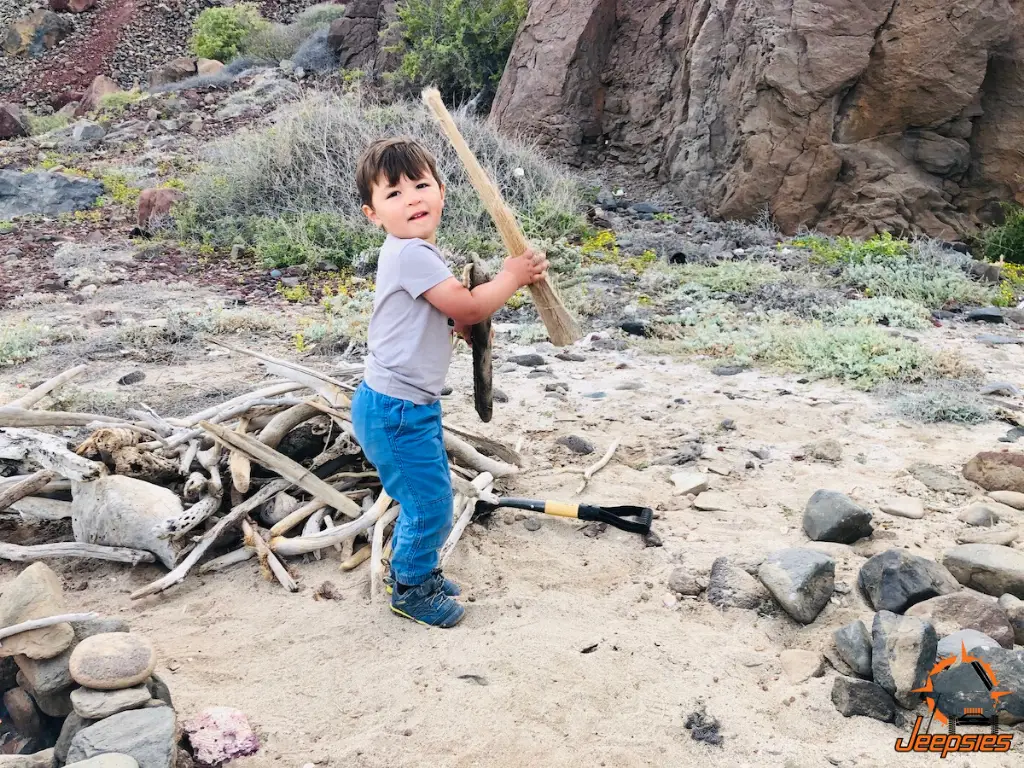
Stalking Internet forums and Facebook group threads, I repeatedly see this cry for help from parents: how in the world do we fit everything our child needs for this overlanding trip?
Take an open-hearted breath and consider this: if stuff was your highest value, then you wouldn’t be overlanding.
Now take a scalpel to everything. If you’re used to living in a spacious home, then this exercise will be particularly hard. We get so used to living with every doodad, we begin to think we (or our child) can’t live without them.
Make your packing list and evaluate what you really need. Be honest about the true definition of “need.” The only way to perfect this process is to take a trip, notate what you didn’t use, and then leave those items at home next time.
The overall goal is to make memories with your family, explore a new area and its people, and learn about your surroundings. Aside from your toddler’s favorite food, diapers/Pull-Ups, and that sacred lovey, there’s no thing you can forget that will stand in the way of your experiences.
So don’t stress about toy volume. Kids are endlessly creative and can make toys out of anything. Rocks, sticks, and bugs are all popular choices.
5/ Consider practicing before you actually go
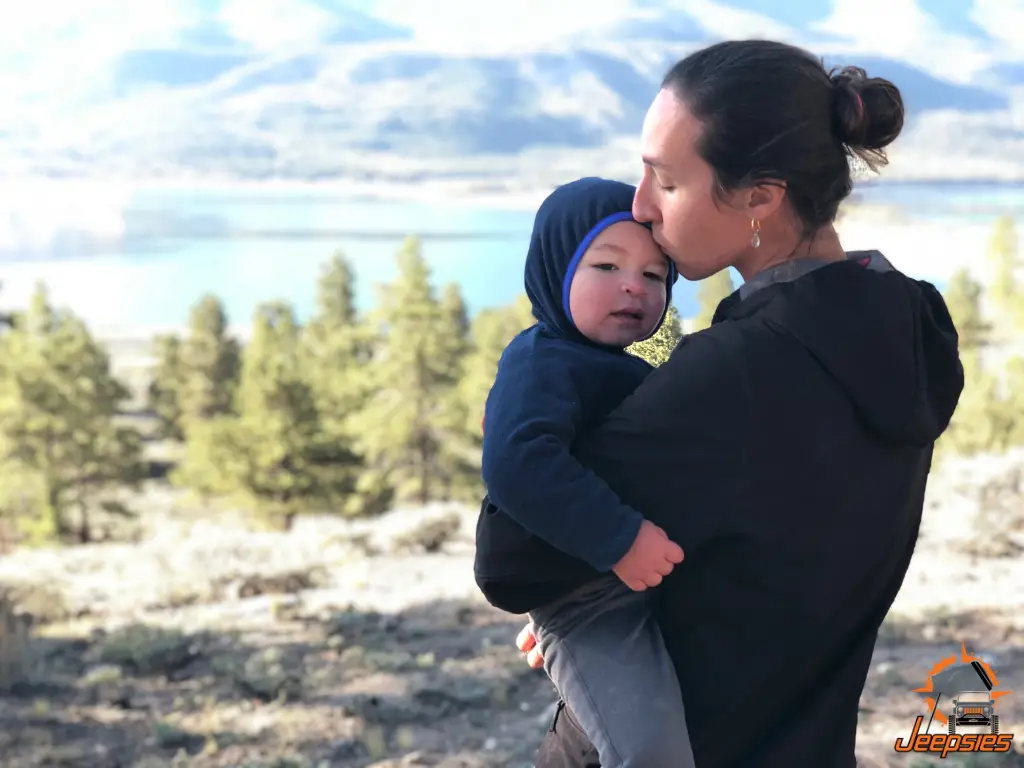
In addition to being endlessly creative, toddlers are beautifully adaptable. Even so, you might consider a practice round before your first big overlanding trip.
Here are some practice ideas:
- Pitch the ground tent or pop open the roof top tent, and spend a night in the back yard or driveway. Bring in the bags to determine how you want to arrange everything. This way, if you get to camp late the first night of your trip, you’ll already know what you need in the tent and where it should go. Not only that, but your toddler will have a chance to get used to sleeping in this new environment.
- Stop using all the toys at home by storing some out of reach. This helps your toddler adjust to the smaller toy volume she’ll have on the trail. You might actually see some benefits that last much longer than your overlanding trip, and decide to cull the toy collection permanently.
- Go hiking or practice another activity you hope to do while overlanding, like fishing or swimming in a lake. This develops healthy expectations in your toddler. It also gives you something to talk about with him, as you all get excited about the upcoming trip.
- Take a long drive, maybe a day trip in your area. Your toddler can get used to time in the car seat, and you can get an idea of how long you’ll be able to go between diaper change/potty breaks. You can also try out ideas on how to pass the time, and make changes if they don’t work as well as you hoped.
6/ Remember, you’re setting the tone
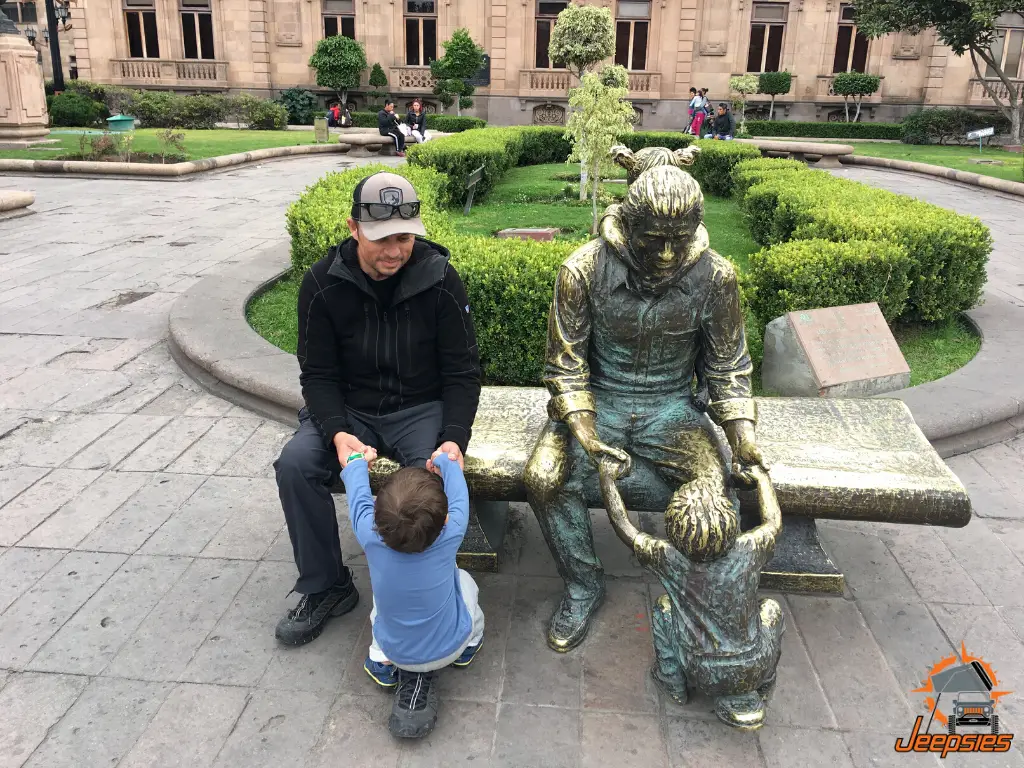
When we talk about overlanding, we aren’t talking about a road trip or camping weekend. We’re talking about an extended journey, often to a remote location, where we need to be self-reliant and flexible. Inevitably, there will be vehicle breakdowns, bad weather, and wrong turns.
When those things happen, remember you and your partner are setting the tone for your toddler. She will vibe off of your mood, and copy how you treat one another. This is a huge responsibility, but also a teaching opportunity. How to communicate well during conflict is an incredible life skill, and your toddler is ready to start learning now.
7/ Take care of yourself
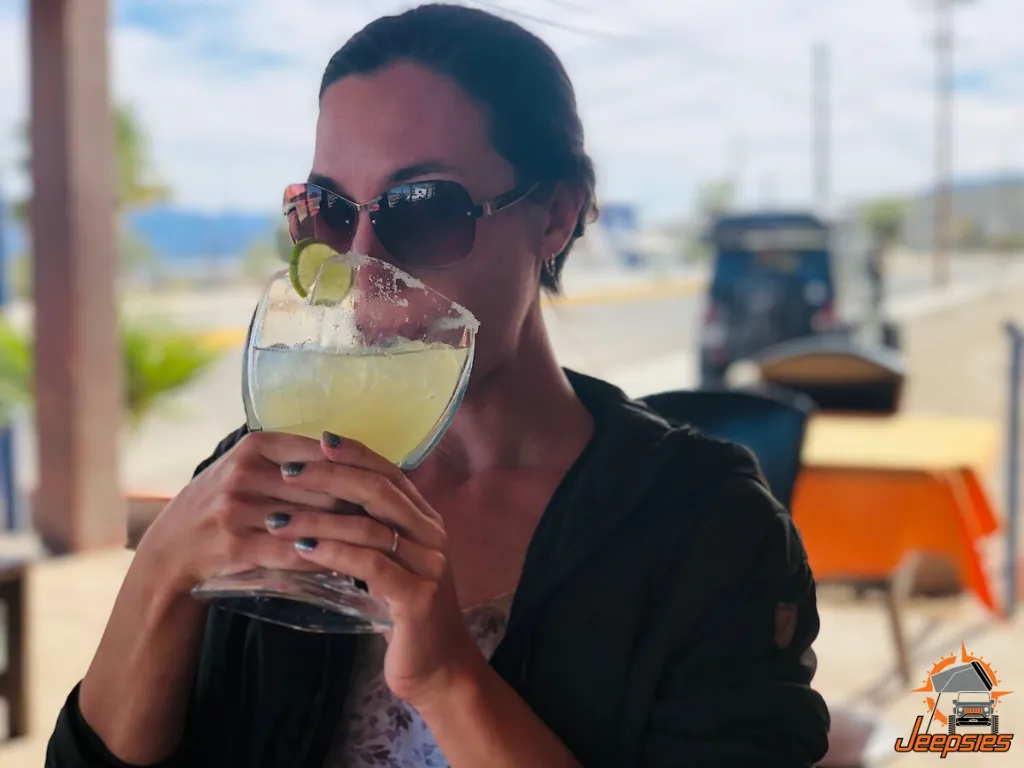
This principle can be especially difficult for parents who are used to falling into bed (sleeping bag) at night and wondering where the day went. But I’ve learned the hard way that ignoring your personal needs will impact the entire family, especially in harsh overlanding conditions.
Moms and dads, figure out what puts wind in your sails, and then make time for that during your trip. For introverts, taking care of yourself might mean going for a solo hike or dragging your chair a few yards from the tent to read a book in peace.
As silly as it sounds, taking care of yourself might mean taking extra time for personal care, like brushing your teeth or changing into clean socks. These little tasks are the ones we tend to place on the back burner when we’re on the road, but they can help us psychologically when we need a boost.
8/ Expect to do bizarre things
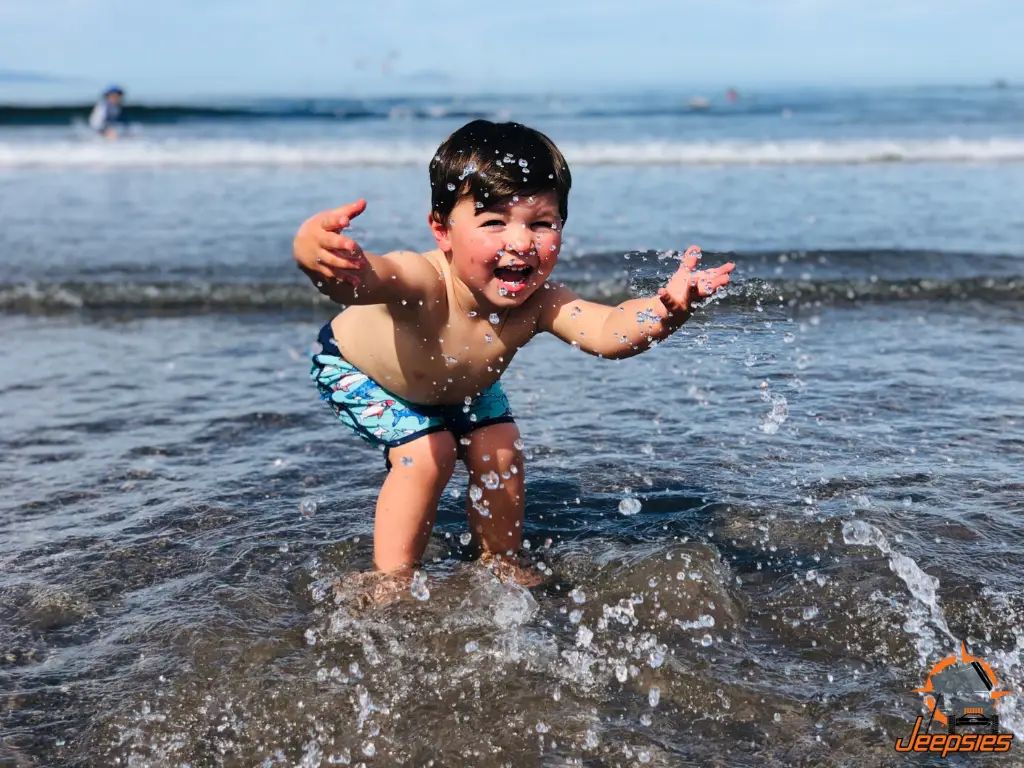
Normal life with a toddler is often bizarre. We find artwork on weird surfaces, created with questionable substances. We hear the most hilarious comments, hilarious because it’s impossible to make sense of them. So why wouldn’t overlanding with a toddler be even more bizarre than normal? Expect it.
One of my favorite memories is pulling off a busy highway onto the shoulder, deep in the interior of Mexico. Because we’re insane, we decided it would be a great idea to potty train Caspian during our first major overlanding trip. He needed to go, so we stopped.
Here we were just off the highway, with 18-wheelers whizzing by at a bajillion kilometers over the speed limit. Caspian was sitting on his frog-shaped potty, close enough to touch the front passenger tire. He was doing his business, completely unphased, while I hoped none of the passing trucks lost control and swerved.
9/ Talk about everything
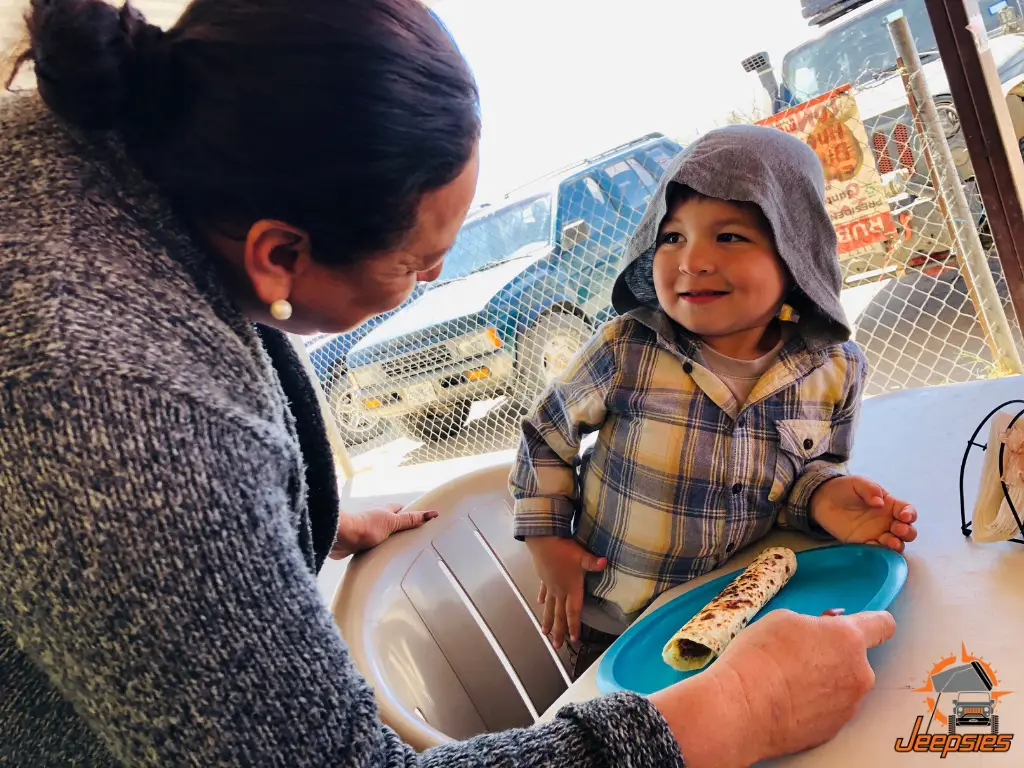
Overland travel is enriching because it exposes your toddler to words and concepts she’ll never encounter inside the walls of a traditional home. People who meet Caspian are always surprised by how verbal he is. But the child has been traveling full-time every moment of his life, and we talk about everything we see around us.
Throughout your time together, look for opportunities to engage your toddler. She has questions, so answer them in detail, until she stops listening. Then do it again with another topic. By the end of your trip, you’ll be able to fill a notebook with the new words and concepts you’ve talked about together.
10/ View screen time with the scrutiny it deserves
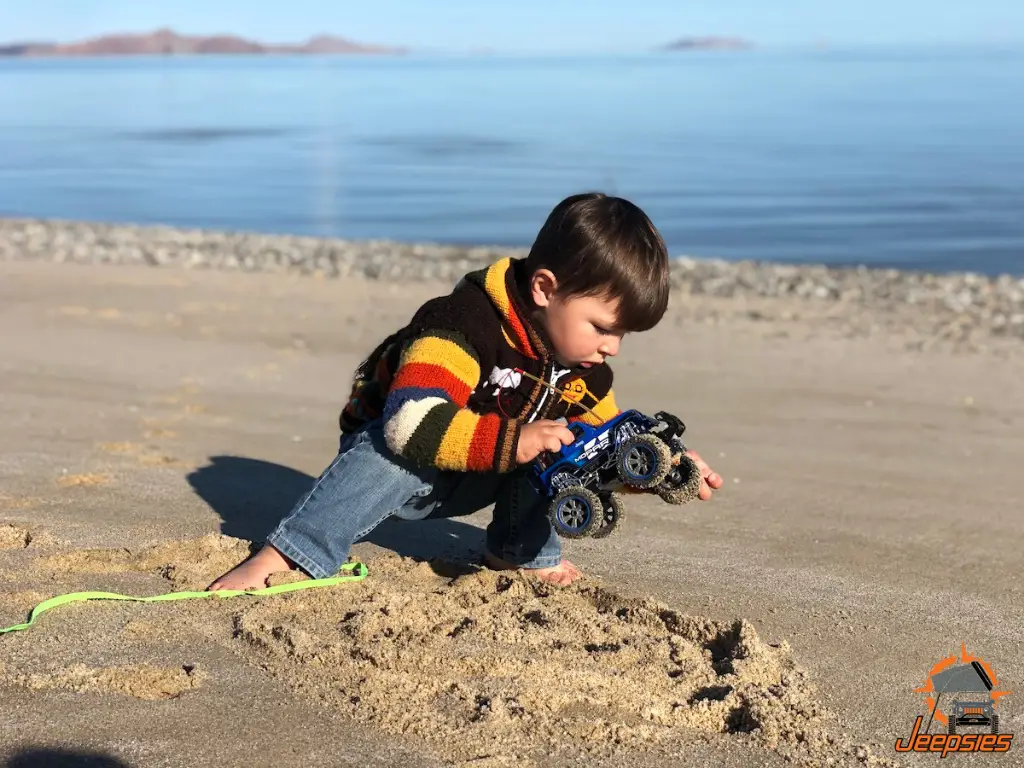
It isn’t your job to entertain your children. If anything, it’s your job to teach your children how to entertain themselves (and you may find, if you get out of the way, they already have it covered).
When it comes to screen time, Eric and I will agree to disagree with you. We’ll never be Internet trolls telling you you’re a bad parent for putting an iPad in front of your toddler and calling it a day.
But for our toddler, we take a strong stance. A growing body of study has shown the negative impacts of screen time on the development of the young brain. So whether we’re sitting at home or driving in the Jeep, we drastically limit Caspian’s screen time.
Is it hard? You better believe it. There are times I want nothing more than to turn him into a zombie for an hour by putting on a show. Sometimes I do exactly that. But for every time I’ve let Caspian watch a screen, there have been 100 other times I’ve chosen to be his companion and playmate. Or I’ve suggested another activity for him to enjoy.
The alternative to screens is more work for parents up front, especially if you’re in a detox phase. But the ultimate reward is a child with a healthy developing mind, who is learning the value of imagination, human interaction, and independent play.
How I love when Caspian wanders outdoors, talking to himself in the midst of an imaginary world. That’s the alternative I choose.
Enriching overland travel with your toddler
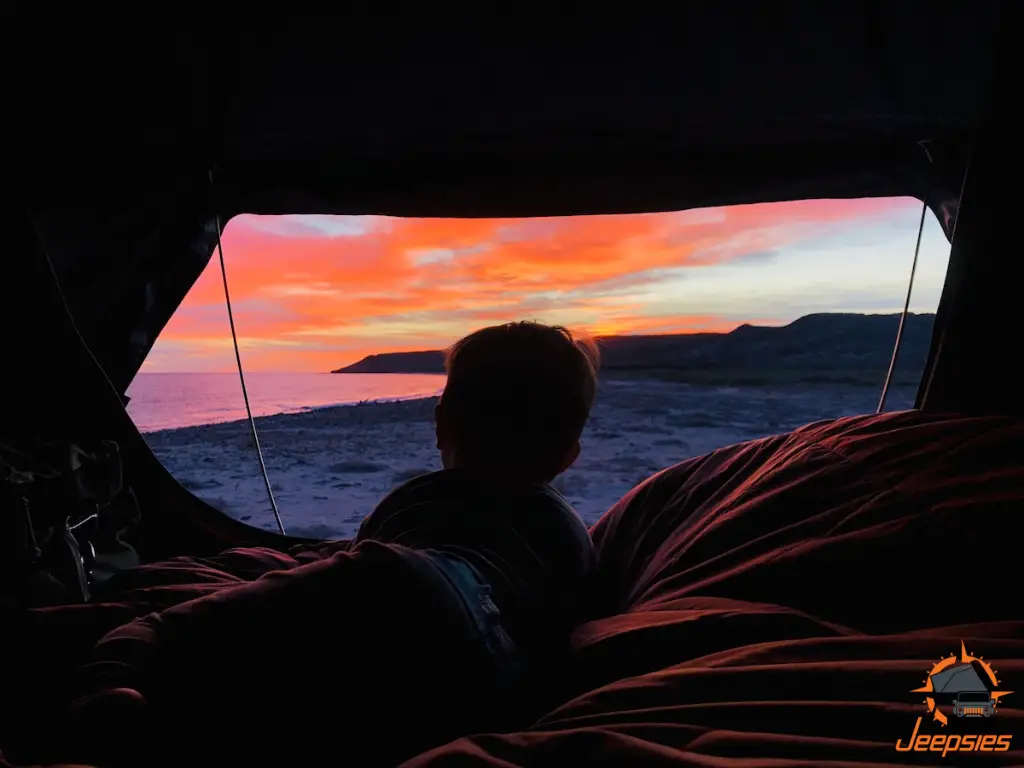
We don’t have the luxury of possessing all of the answers. Those of us who are pursuing overland travel with our toddlers are part of a small tribe, though it’s growing all the time.
At the end of the day, why do we travel? It’s the whisper of the unknown, and the craving to experience other cultures and peoples, that entices us most. With all of the answers, the call might cease.
Embrace the unknowns and hit the trail. Your confidence will grow in leaps and bounds, alongside the little one who means so much to you. I hope these principles will lodge in your bones for the times you need them.
We’ll see you out there.
Until next time, keep it dirty and wheels side down.
~ Eric, Brittany, and #LittleNomad

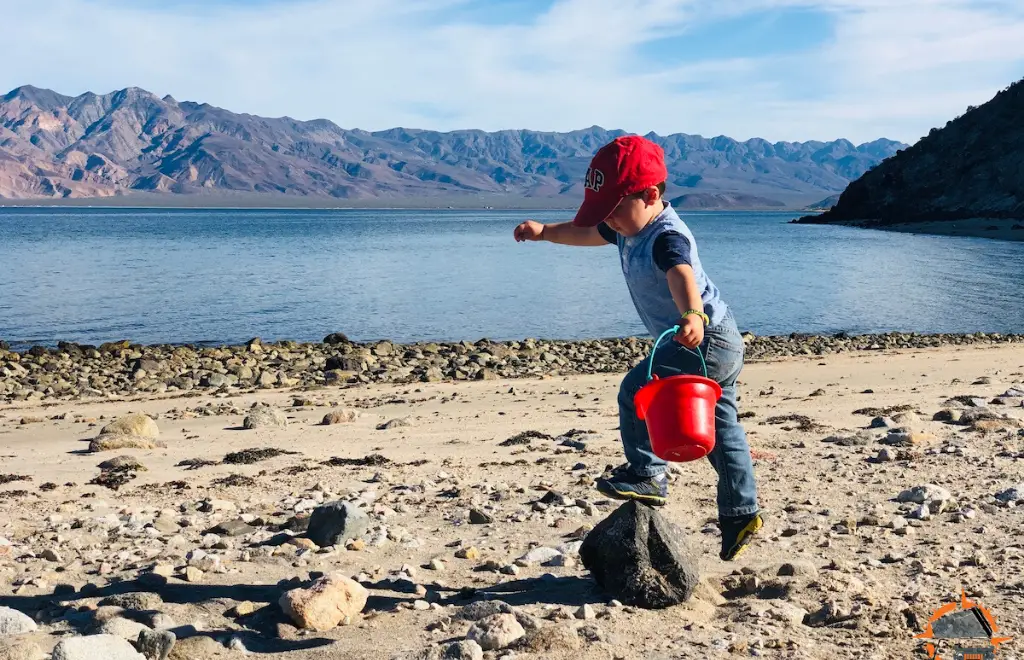

I guess it is never too late for my 8 years old son to experience these kinds of outdoor activities. I am partly to blame for his sedentary lifestyle because he spent most of his time with his gadgets. I have to do better once this pandemic situation is over.
It is never too late to start. Today is the first day of the rest of your life. There is a great way to combine technology with the great outdoors. Look for apps that identify animals and plants. Look for apps that look at the constellations and such. You never know, your 8 year old may find a new passion and start begging you to go on trips together. Memories made are priceless. All my best. ~ Eric
Decided recently I’ll be selling all my things and Overlanding for the 3 warm seasons this year with my 2-year-old son. I’ll have a goal of finding a new province and town to live in but will be completely prepared for long-term living in my rig.
Thanks for your write up.
Sounds fantastic. That’s a great age for travel. Let me know if I can be a resource along the way.